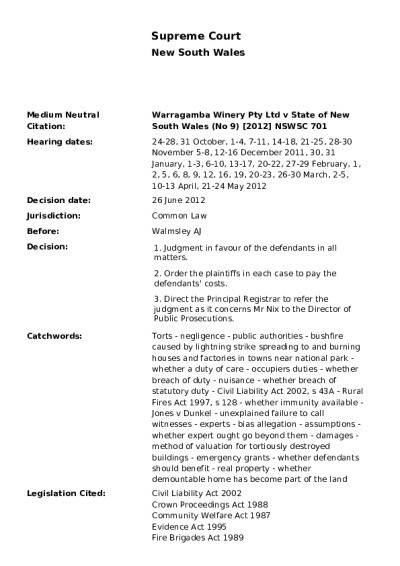
Date
Geographical Area
Pacific
Countries
Australia
Keywords
Case Name
Warragamba Winery Pty Ltd v State of New South Wales (No.9)
Case Reference
[2012] NSWSC 701
Name of Court
Supreme Court of New South Wales
Key Facts
On 23-24 December 2001, two separate fires were started by lightning strikes in the Blue Mountains National Park – known as the Brereton Bend fire and the Mount Hall fire. The Park was occupied and managed by the National Parks and Wildlife Service (NPWS).
The Brereton Bend fire was put out by ground crews on the 24th, however, the Mount Hall fire was not. No ground crews were sent to fight it. One attempt was made to put it out using a helicopter and water bucket, but this attempt failed as the fire was too fierce by then. On 25 December 2001, the Mount Hall fire spread to land managed by the Sydney Catchment Authority (SCA) and the NPWS, then crossed a dam on this land and spread east to the townships of Warragamba, Silverdale and Mulgoa, damaging and destroying properties.
The plaintiffs criticised the failure to begin the firefighting process earlier and the failure to give sufficient warning to the townspeople and/or New South Wales Fire Brigade or New South Wales Rural Fire Service (RFS). The case was pleaded in negligence, nuisance, and breach of statutory duty. It was brought against NPWS and SCA for breach of their duty as occupiers and against RFS for breach of its general duty of care. The defendants denied liability, asserting that they did not believe they owed a duty of care to the plaintiffs, no alleged duty was breached, and no breach of duty which may be found led to any of the alleged losses.
The Brereton Bend fire was put out by ground crews on the 24th, however, the Mount Hall fire was not. No ground crews were sent to fight it. One attempt was made to put it out using a helicopter and water bucket, but this attempt failed as the fire was too fierce by then. On 25 December 2001, the Mount Hall fire spread to land managed by the Sydney Catchment Authority (SCA) and the NPWS, then crossed a dam on this land and spread east to the townships of Warragamba, Silverdale and Mulgoa, damaging and destroying properties.
The plaintiffs criticised the failure to begin the firefighting process earlier and the failure to give sufficient warning to the townspeople and/or New South Wales Fire Brigade or New South Wales Rural Fire Service (RFS). The case was pleaded in negligence, nuisance, and breach of statutory duty. It was brought against NPWS and SCA for breach of their duty as occupiers and against RFS for breach of its general duty of care. The defendants denied liability, asserting that they did not believe they owed a duty of care to the plaintiffs, no alleged duty was breached, and no breach of duty which may be found led to any of the alleged losses.
Decision and Reasoning
As the plaintiffs conceded that the nuisance count should fail if negligence could not be established, and the Court held that the statutes relied on by the plaintiffs did not create an actionable statutory duty, the Court stated that the case either stood or fell on the law of negligence.
General duty: The Court held that the defendants did not owe a duty of care to the plaintiffs as they did not make the fire worse, create a new hazard or have any control over the fire. Furthermore, the Court held that the plaintiffs were no more vulnerable than other members of the public, so the defendants could not have been expected to have concentrated their attention on individual plaintiffs, instead they had to consider the community as a whole.
Occupiers’ duty: In terms of SCA and NPSW, the Court held that neither did anything to make the fire worse and there was nothing either could have done to stop the fire. The Court also noted that the obligation to reduce or abate a hazard did not include warning someone, as this would be a new and unjustified meaning of reduce and abate. Therefore, they did not owe a duty of care as occupiers.
General duty: The Court held that the defendants did not owe a duty of care to the plaintiffs as they did not make the fire worse, create a new hazard or have any control over the fire. Furthermore, the Court held that the plaintiffs were no more vulnerable than other members of the public, so the defendants could not have been expected to have concentrated their attention on individual plaintiffs, instead they had to consider the community as a whole.
Occupiers’ duty: In terms of SCA and NPSW, the Court held that neither did anything to make the fire worse and there was nothing either could have done to stop the fire. The Court also noted that the obligation to reduce or abate a hazard did not include warning someone, as this would be a new and unjustified meaning of reduce and abate. Therefore, they did not owe a duty of care as occupiers.
Outcome
The plaintiffs’ claims against all the defendants were dismissed.
Link
Disclaimer
This case law summary was developed as part of the Disaster Law Database (DISLAW) project, and is not an official record of the case.
Document
Document